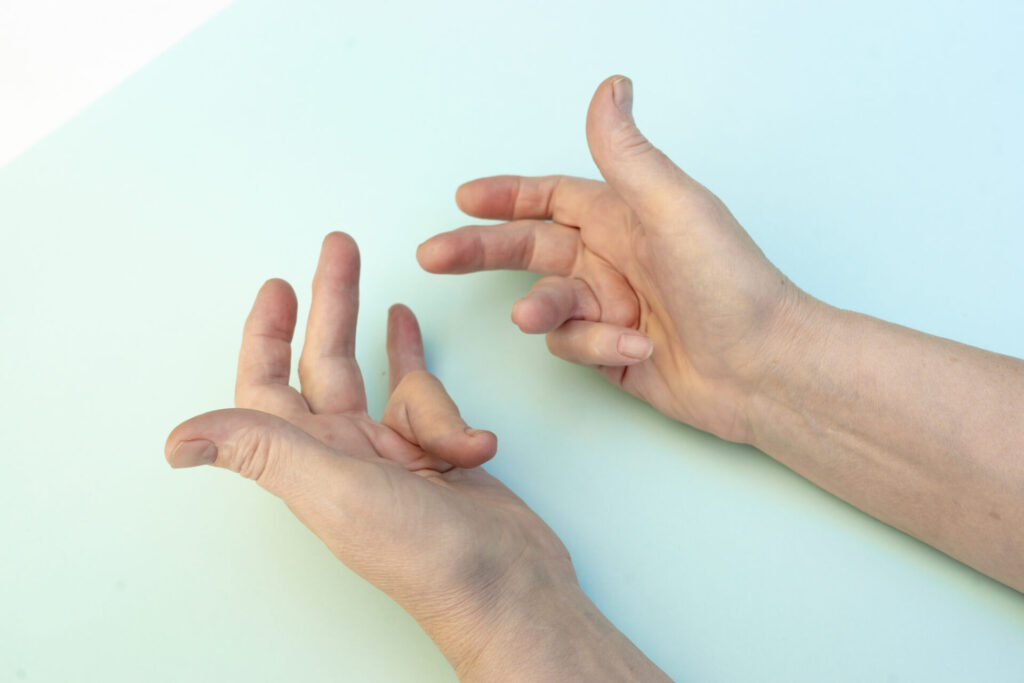What is Dupuytren's contracture?
Dupuytren’s contracture is an abnormal thickening of tissues in the palm of your hand. This thickened tissue may develop into a hard, non-cancerous lump. This can cause 1 or more fingers to bend towards your palm. There’s no cure, but this condition is not life-threatening and your fingers can be straightened if it’s severe.
The exact cause of Dupuytren’s contracture is unknown. However, it commonly runs in families with a Northern European background. Diabetes, heavy drinking, smoking and medications taken for epilepsy are also associated with the disease.
Symptoms include unusual dimples on your palm, a thickening of the skin on your palm and tenderness around your palm. Over a period of time the thickening may worse. The ring finger is the most commonly affected, followed by the little and middle finger.
Treatment depends on the severity of your condition. Mild cases do not need treatment. However, If you cannot get your hand flat on the table or if the bend in the fingers is significantly affecting your daily life then, you might benefit from surgery.

Ready to book now? Get in touch to discuss your needs and decide on the best course of treatment for you.
Ready to book now? Get in touch to discuss your needs and decide on the best course of treatment for you.
What is Dupuytren's contracture surgery (palmar fasciectomy)?
Your consultant will explain your options and, after a physical examination, they will recommend the best course of treatment for you. If your case is particularly severe, they may recommend surgery. This procedure involves removing the diseased tissue from your palm and digits with the intention of allowing full straightening. Whether or not the surgery will fully correct the issue depends on multiple factors such as: the severity of your angle of contracture, the other tissues involved, the length of time your finger has been bent and your expected postoperative recovery.
Your surgeon may recommend a specific type of surgery called a fasciectomy, an umbrella term for a few different surgical techniques. Some are simpler and involve taking away only the diseased tissue under the skin, but sometimes it is necessary to remove the skin as well and a small skin graft will be used to cover the affected area.
What happens during a palmar fasciectomy?
Your experience will depend on which type of fasciectomy is recommended for your particular case. Your operation can be carried out under local anaesthetic, sedation or general anaesthetic. It is a relatively short procedure and you will usually go home on the same day.
This procedure removes the diseased tissue to allow the digits to straighten again. Achieving a full correction depends on a few factors, including how severe your case is. There are a variety of different ways a fasciectomy can be carried out. Your surgeon will give you more information about the types of treatment that could work for you and whether they think a full correction is possible.
Preparing for your surgery
Your surgeon will give you simple preparation advice to help you get ready for your operation. If having general anaesthetic, you will undergo a few medical checks prior to your surgery date.
You may be advised to stop taking medications a few days before surgery, particularly if you take aspirin or other blood-thinning drugs. If you smoke, you may be advised to stop. This is because smoking increases your chances of getting a wound infection, which can slow down your recovery after surgery.
It is advised that you prepare your home and living arrangements for your return from hospital. You may also need some extra help around the house too, so see if a friend or family member can stay with you to support.
Recovering from your surgery
Your hand and fingers may be swollen for the first few days. Most people need pain medicine for about a week after surgery.
After surgery and hand therapy, your hand and fingers should be more flexible. Most people get better without any problems. You can expect your function to improve significantly after the operation.
An important part of recovery is hand therapy. Work with your physiotherapist or consultant and practice hand exercises at home to help your fingers become more flexible.
How soon you can return to work depends on your job. If you can do your job without using the hand, you may be able to go back in 1 to 2 weeks. But if your job requires you to do repeated finger movements, put pressure on your hand, or lift things, you may need to take longer off work. Your doctor can help you decide how much time you will need to take off work.
What are the alternatives to surgery?
Treatment purely depends on the severity of the condition. Mild cases don’t need treatment, and can instead be managed with non-surgical treatment or no treatment at all.
Complications and side effects
Your consultant will discuss the risks and benefits of this surgery to help you make an informed decision.
Complications may include:
- A thickened or tender scar which may reduce over 12 months
- Areas of numbness which may reduce over 12 months
- A return of symptoms over time, because there is no cure for this disease, which may require further surgery.
Cost
Please call us to discuss pricing at your local clinic.
-
Carpal tunnel release surgery £1,375.00

